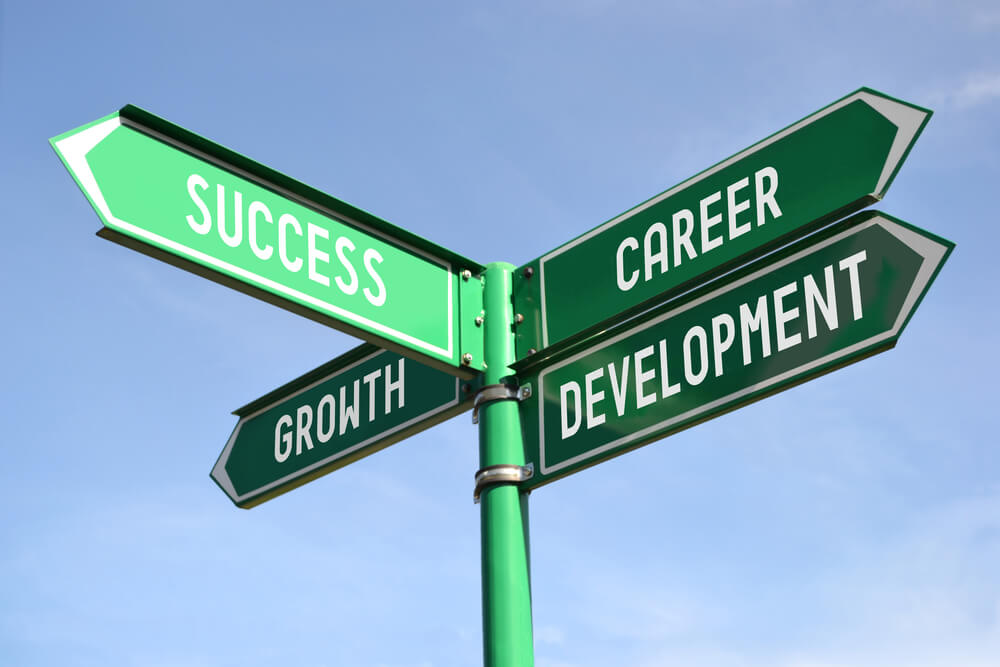Personal Development at Work: Tips for Growth and Success
Looking to land the job of your dreams? Meet the ResumeGiants team: a crew of resume-writing experts, career coaches, and contributing authors dedicated to helping you succeed. Every article is carefully reviewed by Certified Professional Resume Writers, so you know you’re getting top-notch advice. Plus, with our free online resume builder, you can access multiple professional templates and optimize your resume with expert tips and examples. We’ve helped job seekers around the world, and we’re ready to help you too!
Career development is often envisioned as a relentless climb up the corporate ladder, synonymous with increased responsibilities and heightened stress.
However, career development should not look like this. Growing professionally should align with our values and allow us to balance work with our personal lives.
There are many resources available today that can equip you with the knowledge and skills to move forward without any added headaches.
In this article, we’ll demystify career development and offer practical strategies for professional growth that reconcile with mental health preservation and personal development.
Understanding Career Development
Career development is a lifelong process of managing learning, work, leisure, and transitions to move toward personal goals.
Professional growth is not merely about promotions or salary increments; it’s about expanding your skill set, knowledge, and experiences. According to the National Career Development Association (NCDA), career development involves a person’s total life, not just occupation. In other words, you are so much more than your job.
Universal Strategies for Career Advancement
Regardless of profession, there are several universal strategies for career advancement:
- Continuous Learning: Engage in lifelong learning to keep up with industry trends and technologies. Several online platforms and apps offer online courses. Download books, or even get them second-hand. Learning does not have to be expensive. Learn from your peers or people you admire. Join a community that shares your passion.
- Networking: Build a robust professional network for opportunities and mentorship. There are plenty of other networking opportunities outside of LinkedIn. Networking does not have to be online only. Avoid focusing on quantity, rather, focus on making a few meaningful connections.
- Goal Setting: Establish clear, actionable goals with timelines. Less is more. Be realistic about the goals you can accomplish. When you reach those goals, celebrate! It will encourage you to keep going.
- Flexibility: Be open to change and adaptable to new environments or processes. At times, things do not go the way we expect them to. Adaptability is an essential life skill.
- Feedback: Seek and constructively respond to feedback to refine your skills. Learn not to take criticism personally, feedback is about the work you do, not about who you are as a person. Learn to distinguish between who you are and the work you do. Feedback is a constant and will only make you a better professional.
Prioritizing Mental Health
As we strive for professional success, it’s crucial to prioritize mental health. According to a study by Gallup, nearly two-thirds of full-time workers in the US experience burnout on the job.
Burnout is a state of emotional, physical and emotional exhaustion. It occurs when a person has been under excessive and prolonged stress. High workloads, long working hours, limited support, lack of balance between work and personal life, lack of control in the workplace, and many other factors contribute to burnout.
These are ways you can prioritize your mental health. Without mental health, you cannot grow professionally.
Work-Life Balance: Maintain clear boundaries between work and personal life. This means not answering phone calls or emails once your shift is over, or not working overtime without proper compensation. It also means taking the time off you are entitled to.
Stress Management: Develop healthy coping mechanisms for stress, such as exercise or meditation. Find a workout you enjoy. Some people don’t enjoy going to the gym but do like playing a sport, whatever it is, move your body. Exercise produces endorphins, and in very little time, you will notice the difference.
Support Systems: Lean on friends, family, and mental health professionals when necessary. Try journaling or a gratitude journal. Therapy might be expensive for some, if that’s the case, look for support groups.
According to the American Psychological Association (APA), work-life balance is critical to managing stress and preventing burnout. Make time for yourself. Spend time with the people you love and do things that make you happy. Cooking a meal, fixing something at home, helping a friend move. Little things go a long way.


In this article, we’ll demystify career development and offer practical strategies for professional growth.
RESUME GIANTS
Personal Development Areas to Focus On
Personal development extends beyond your professional life and includes:
- Emotional Intelligence: The first step to developing emotional intelligence is to become more self-aware. Learn to recognize and understand your emotions. Practice self-reflection. Then, work on managing your emotions and how you react or respond to different situations.
- Communication Skills: Enhance both verbal and non-verbal communication. Practice active listening. Take more time to answer. Process information before responding. Be more inclusive, check how everyone feels.
- Time Management: Improve productivity and reduce stress through efficient time management. Set a clear goal or priority list for the day. Delegate tasks if you can, and trust in your team. Minimize distractions. Start with the more important and challenging tasks first.
Benefits of Personal Development
A personal development plan can provide several benefits. You can ask a mentor, your boss, or a colleague to help you set one up. However, you can set one up for yourself too.
By creating a career development plan you can keep track of your goals. It will contribute to your self-awareness and self-confidence. Planning improves time management and productivity, fostering personal growth and continuous learning.
These are other ways in which a personal development plan helps you:
- Increased Job Satisfaction: As you grow personally, you’re likely to feel more satisfied at work.
- Better Performance: Skills like time management directly improve job performance.
- Enhanced Well-being: Emotional intelligence is linked to better mental health.
Guidance Through the Journey – Find A Mentor
Mentors, career coaches, and counselors can provide valuable guidance. Organizations like the International Coaching Federation (ICF) offer resources to find certified coaches.
A mentor is a person who can help you in many ways. They can support you through your journey, offer insights based on their experience, encourage you to set goals and reach them, provide you feedback, and develop new skills.
Mentors can also guide you through networking or connect you with other professionals.
Taking Ownership of Your Career
No one can make decisions about your career, except you. While there are external factors that influence our decisions, we must take ownership of our career and the path we are on.
Taking ownership means being proactive about your career path:
- Self-Assessment: Regularly evaluate your interests, values, and skills.
- Decision-Making: Make informed choices about your career trajectory.
- Self-Advocacy: Communicate your achievements and career aspirations.
Knowing When to Move On
Sometimes, career advancement means knowing when to leave a role or organization:
- Alignment with Goals: If a job doesn’t align with your goals, it may be time to leave.
- Professional Growth: Look for opportunities that offer growth and learning.
- Personal Well-being: Never compromise your mental or physical health for a job.
Evaluate whether your company values your work. No job is worth your health.
In conclusion, career development is a multifaceted journey that should not come at the expense of your mental health.
By embracing continuous learning, establishing a support system, and developing personal skills, you can advance your career while maintaining a healthy work-life balance. Remember, professional growth is not a race but a personal journey toward fulfillment and well-being.
Want new articles before they get published? Subscribe to our Awesome Newsletter.

CAREER ADVICE

GOV TALK

TRENDS
